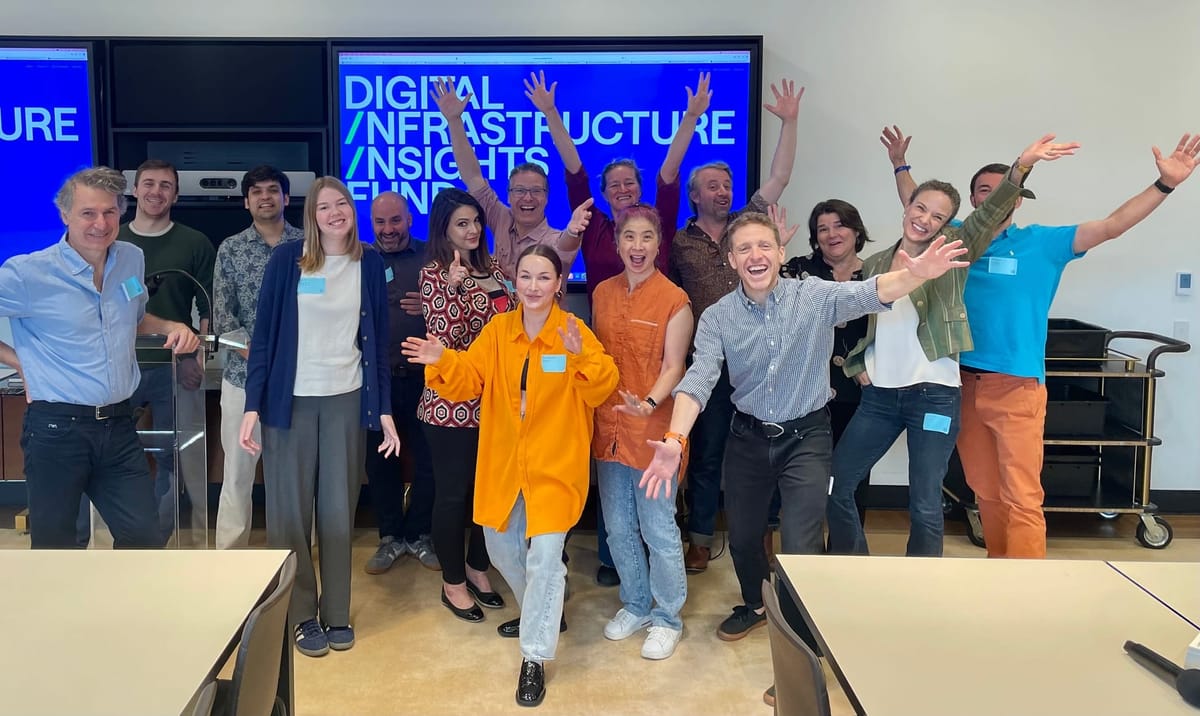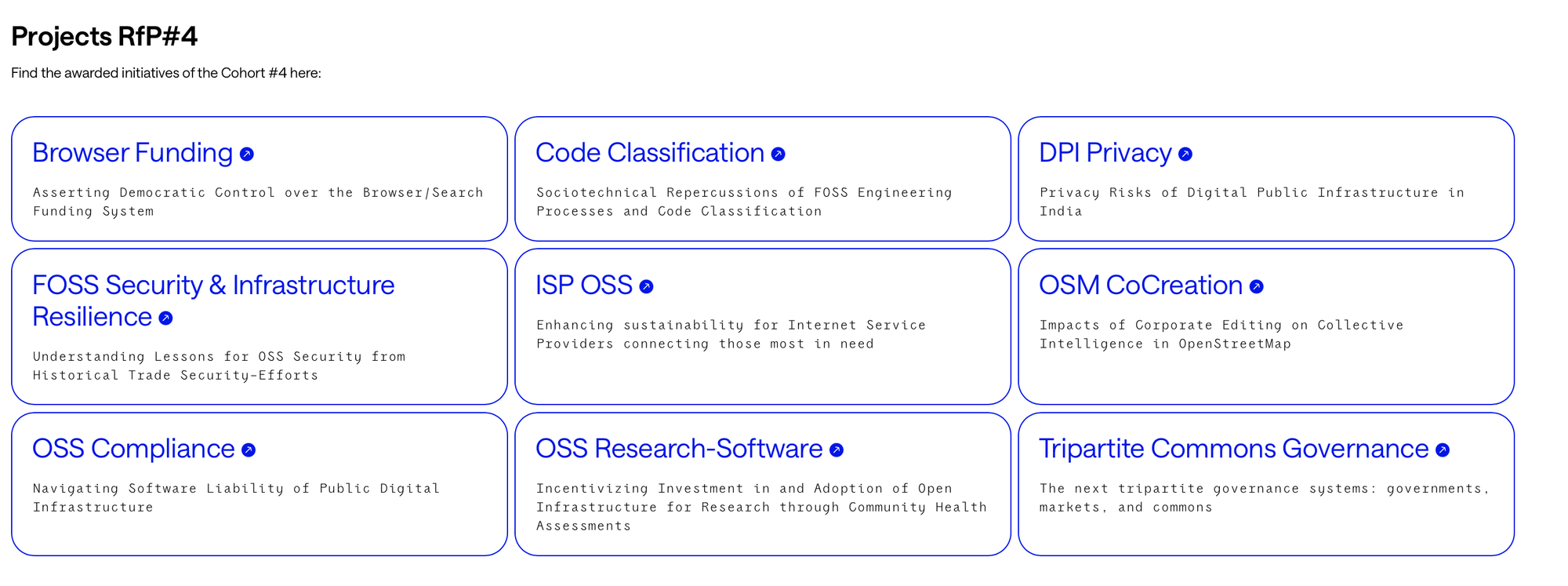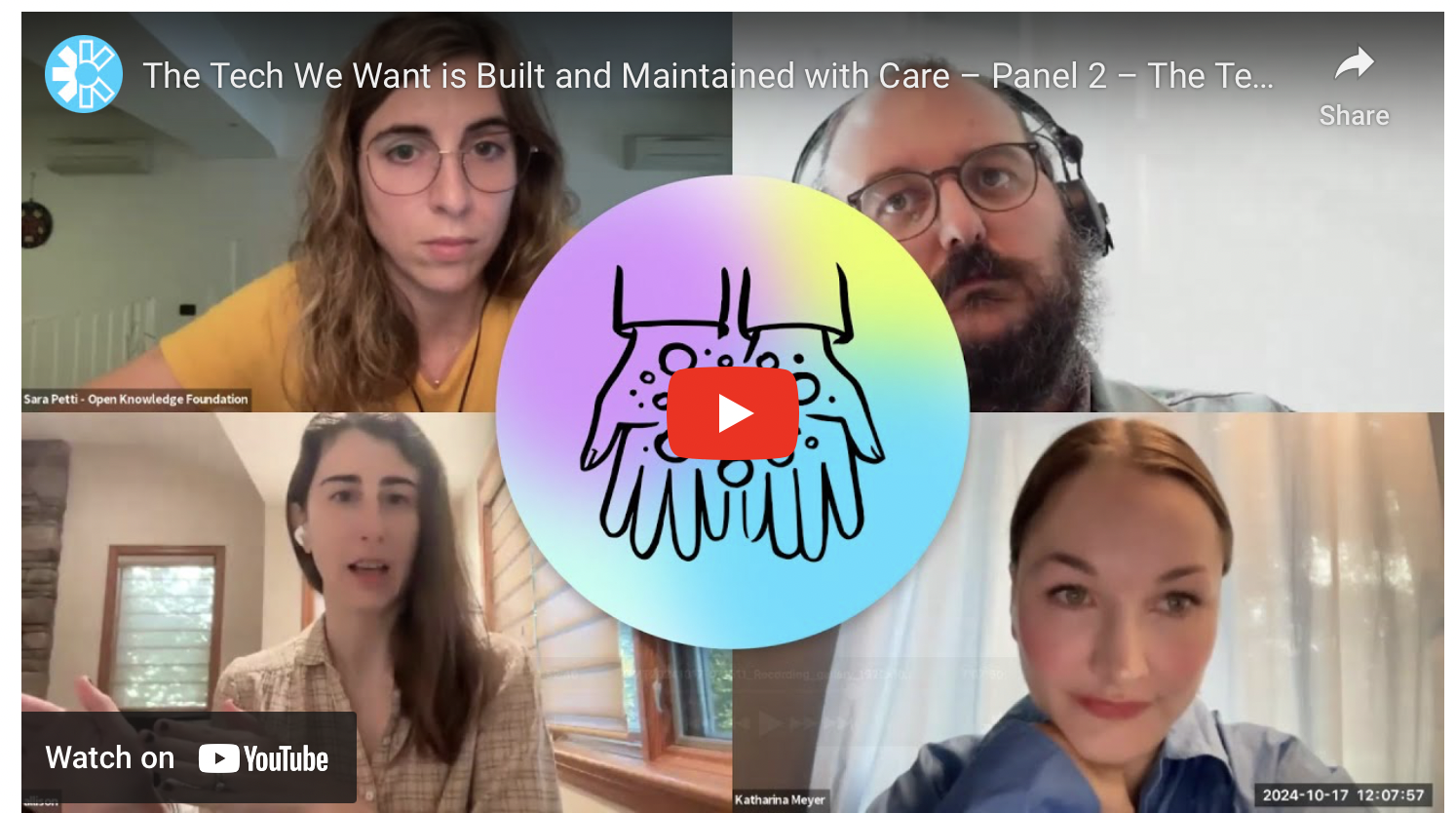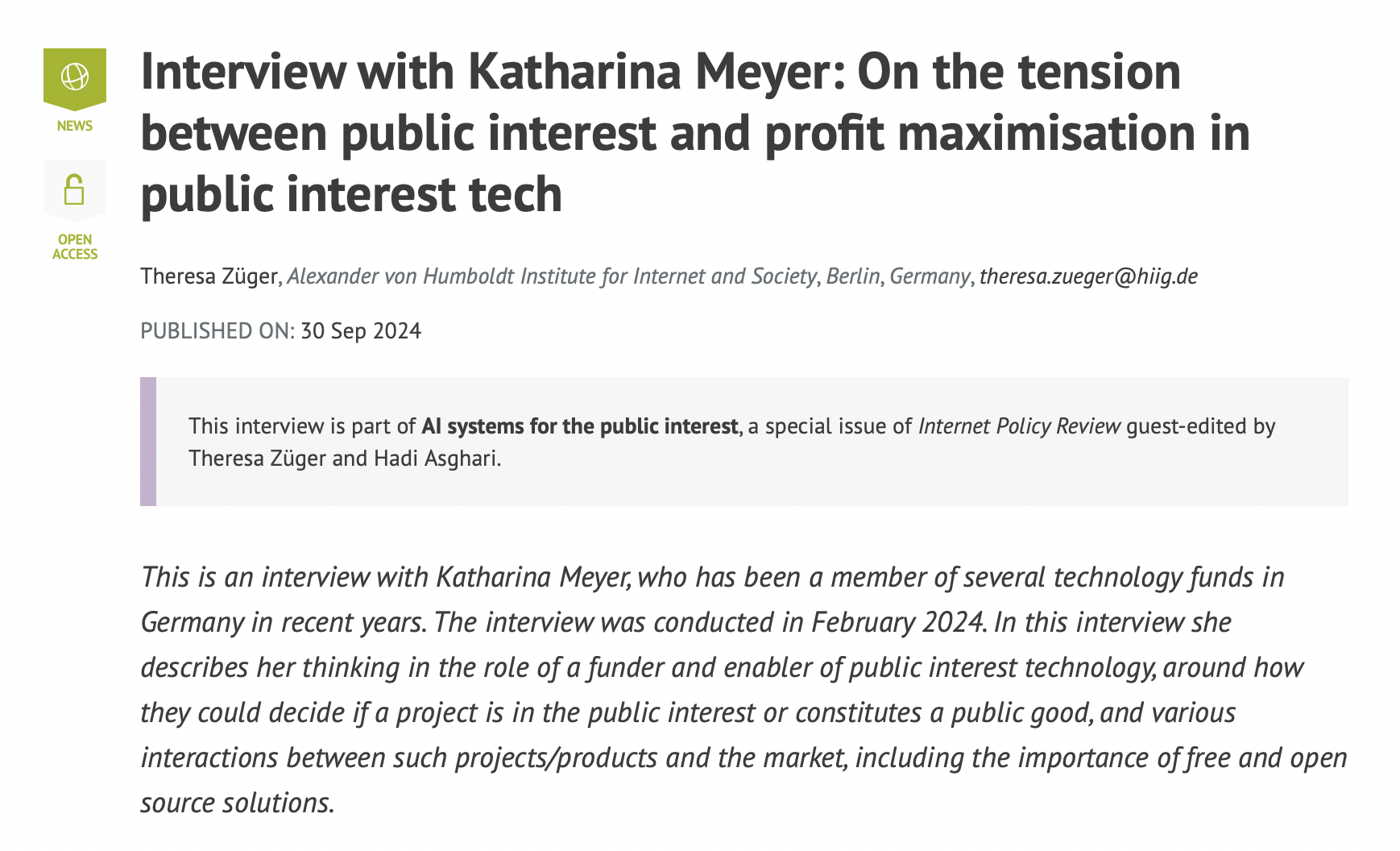End of year 2024 - Updates from D//F

Dear Reader-
I hope this email finds you...well.
Digital Infrastructure Insights Fund recently updated its technical infrastructure (including its newsletter provider) and returns all shiny and new with a myriad of updates- just in time for the festive season:
Overview
- (Cohort 3): New reports published
- (Cohort 4): 9 new projects commencing
- Review: Recent talks & publications on D//F
(Cohort 3): 2 New reports published
Balancing the Benefits and Risks of Open Source GenAI
Nick Botton & Mathias Vermeulen (AWO Agency)
https://infrastructureinsights.fund/projects/cutting-through-open-washing/
Full Report: Access the full paper here.
Our grantees from AWO Agency have released a new paper on boundaries of openness, focusing on the intricate dynamics of open-source generative AI (GenAI)
- Openness Challenges: GenAI openness boosts competition and knowledge distribution but opens the door to misuse by malicious actors who can strip safeguards and use AI models harmfully.
- Open Washing: Companies misleadingly label models as "open" while maintaining restrictive practices, diverting focus from genuine openness risks and complicating regulation.
- Policy Gaps: Current frameworks (EU, UK, US) inadequately address GenAI openness. Opportunities exist, such as the EU AI Act's Code of Practice on General Purpose AI.
- Recommendations: The paper proposes fostering openness for external researchers to maximize transparency benefits while managing risks collaboratively.
Fediverse Governance: Successes and Gaps
Erin Kissane & Darius Kazemi
https://infrastructureinsights.fund/projects/fediverse-governance-successes-gaps/
Full Report: here
Decentralized social media, particularly the Fediverse, represents both immense opportunities (particularly at this very moment in time) and nuanced social and technical risks.
Researchers Erin Kissane and Darius Kazemi explored governance practices on various small to medium sized Fediverse servers, identifying successes and gaps to inform future improvements.
🎧 Listen: Erin Kissane's insights on TechPolicy.Press: Podcast here.
👨🏫 Watch: Darius Kazemi’s talks at FOSSY and XOXO: FOSSY, XOXO.
- The research underscores the importance of governance models in supporting community-led social networks, helping them avoid the pitfalls of centralized platforms like pervasive surveillance or manipulative algorithms.
- It highlights gaps in human and digital infrastructure, focusing on practical strategies to empower server administrators while improving resiliency.
Huge congratulations to both research groups on their report's release and the meaningful impact they bring!
📢 (Cohort 4) 9 new projects commencing
The fourth cohort of the Digital Infrastructure Insights Fund, commencing their projects from this November, brings forward an exciting range of projects across thematic clusters.
New initiatives are set to advance governance, privacy, sustainability, and research ecosystems for open technologies globally (detailed info below and in our press release).
We are so excited to work with the new researchers- give them a warm welcome (partial group picture above).

Overview Cohort 4:
Governance, Policy & Regulation
- Democratic Governance for Browser Funding (Robin Berjon):
Developing governance models to democratize revenue-sharing in browser and search software.
https://infrastructureinsights.fund/projects/browser-funding/ - Legal Liabilities in Open Source Development (Benedict Kingsbury, Angelina Fisher, Han-Wei Liu, Thomas Streinz):
Exploring regulatory challenges faced by FOSS communities, with a focus on non-commercial developers.
https://infrastructureinsights.fund/projects/oss-compliance/ - Securing Open Source Supply Chains (Stephanie Lieggi, Jarrod Millman, Robert Shaw, Juanita Gomez):
Applying historic trade security frameworks to strengthen open-source software supply chains.
https://infrastructureinsights.fund/projects/foss-security-infrastructure-resilience/ - Governance of Public-Private-Commons Systems (Marco Berlinguer, Massimo Florio, Silvia Vignetti):
Investigating innovative governance models for collaborations between governments, markets, and commons.
https://infrastructureinsights.fund/projects/tripartite-commons-governance/
Privacy & Security
- Privacy Risks in Indian Digital Public Infrastructure (Divyank Katira, Gurshabad Grover, Anunay Kulshrestha):
Examining privacy challenges and surveillance risks in India’s expansive digital infrastructure.
https://infrastructureinsights.fund/projects/dpi-privacy/
Sustainability & Community Impact
- Sustainability for Community-Focused ISPs in Brazil (Nathalia Foditsch):
Leveraging FOSS to expand affordable internet access while improving operational sustainability.
https://infrastructureinsights.fund/projects/isp-oss/ - Corporate Impacts on OpenStreetMap (Yair Grinberger):
Analyzing how corporate contributions shape collaboration and autonomy in OpenStreetMap.
https://infrastructureinsights.fund/projects/osm-cocreation/ - FOSS Engineering and Community Impact (Darren Gergle, Aaron Shaw, Matt Gaughan):
Studying MediaWiki’s technical development processes to understand impacts on sustainability and community engagement.
https://infrastructureinsights.fund/projects/code-classification/
Research Software Ecosystem & Metrics
- Incentivizing Open Research Infrastructure (Katherine Skinner, Chrys Wu, Lauren Collister):
Evaluating how health metrics for open projects drive investment and foster sustainability.
https://infrastructureinsights.fund/projects/oss-research-software/
Further updates and co-commissions to follow- stay tuned!
Review: Recent talks & publications on and with D//F
🔍 Event Spotlight: The Tech We Want Summit
As the first endeavour in a series of outreach activities Katharina Meyer, D//Fs Program Director, joined the Tech We Want Summit to discuss the critical yet invisible role of maintenance in digital infrastructure.
The summit featured 43 speakers across 23 countries and over 700 participants, engaging i.a. in discussions about sustainable software development.

Re-watch the Panel here: https://blog.okfn.org/2024/11/06/panel-the-tech-we-want-is-built-and-maintained-with-care/
Discussion Highlights:
- The Role of Maintenance: Maintaining software systems is as crucial as innovation itself. This ongoing care, akin to tending a garden, ensures the sustainability and functionality of digital ecosystems.
- Systemic Challenges including: Burnout due to overwhelming workloads., Lack of Recognition, with maintenance often overlooked in favor of innovation, Inadequate Funding, which limits the capacity to support essential work.
- Ethical and Social Implications: The neglect of digital infrastructure maintenance has serious consequences, including vulnerabilities in critical systems that society depends. The panelists underscored the ethical responsibility to support and care for the technologies underpinning our digital lives.
- The panel urged a paradigm shift in how maintenance is valued and supported, calling for: Shared Responsibility: Corporations, open-source communities, and funders must collectively recognize and support maintainers, Support Structures: Communities and institutions need to provide resources and frameworks to enable maintainers to thrive.
✨ Event Spotlight: Open Forum Academy Symposium
Katharina furthermore delivered a keynote at the Open Forum Academy Symposium at Harvard, reflecting on the role of research in supporting open-source ecosystems.
Full program here: https://symposium.openforumeurope.org
Preprints of all conference talks and video material will be available soon.
Key Themes of Keynote:
- Exploring how norms, dependencies, and technical standards underpin open technologies.
- Balancing market, public, and research interests in public interest technologies.
- Highlighting D//F’s portfolio as a model for aligning research and societal needs.
Current and former grantees, reviewers and ecosystem partners of D//F also presented their research findings at the Symposium:
- Stephen Jacobs addressed the limitations of the predominant funding models for Free and Open Source Software (FOSS) and proposed strategies to ensure long-term project sustainability by focusing on community development.
- Cailean Osborne, Paul Sharratt and Dawn Foster explored the growing role of governments in funding the development and maintenance of open source software (OSS) and presented insights into measuring the impact of public funding.
- Matt Germonprez addressed the complexity of open-source software supply chains, proposing a framework to empirically understand them as sociotechnical systems.
- Ryan Ellis explored the integration of bug bounty programs—vulnerability reward programs designed to identify and address security flaws—with open-source software projects.
📰 Publication: D//F featured in Internet Policy Review
In a recent interview with the Internet Policy Review (https://policyreview.info/articles/news/interview-katharina-meyer), Katharina reflected on the critical tension between public interest and profit maximization in the realm of public interest technology - underscoring the need to balancing market dynamics with proactive policies and collaborative governance to ensure open technologies remain robust, equitable, and inclusive.

tldr: Those were just a few highlights of the work that D//F as field-builder and alignment actor undertook in 2024.
We have more activities planned for 2025, such as convening a working group on quantitative methodologies in Open Source-Software and Community-Research, a Manifesto- and our first two commissions with partners.
You will be the first to know!
PS: If you have any questions, remarks, etc. - as always, don't hesitate to reach out!
